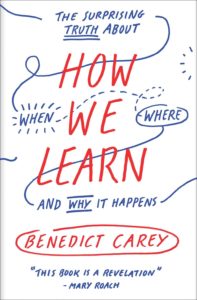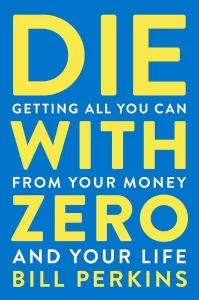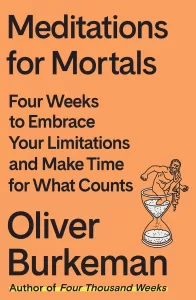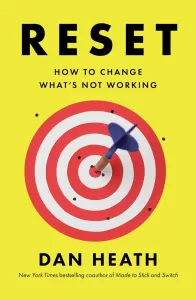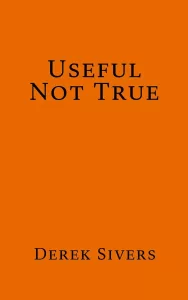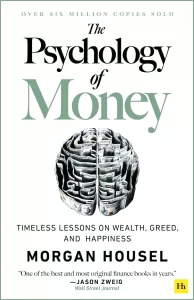Book Review: “How We Learn”
Book: How We Learn by Benedict Carey
Reviewer: Bobby Powers
My Thoughts: 8 of 10
Carey dove into the fascinating world of learning and memory in the early 2000s when he became a science reporter for the Los Angeles Times, then the New York Times. He compiled what he's learned into this easy-to-read book that offers practical advice for anyone trying to learn new things. I've already incorporated ideas from How We Learn into the way I read and study new topics.
What I Learned from the Book
There are a million theories about how best to learn new things, but most of those theories are garbage. Thankfully, the field of cognitive science has taken some large strides in the past few decades, and we're finally starting to learn the best way to learn. Here are a few of the surprising things that help us remember material better:
- Taking a test on a subject before you learn it
- Listening to music while you study
- Walking away from the material for a while
- Spreading out study sessions over multiple days or weeks rather than studying at one time
- Varying the type of material you're studying or practicing rather than batching together the same skill to study it exclusively
Selected Quotes and Ideas from the Book
How Our Memories Work
- "Any memory has two strengths, a storage strength and a retrieval strength."
- "Storage strength is just that, a measure of how well learned something is. It builds up steadily with studying, and more sharply with use."
- "Retrieval strength, on the other hand, is a measure of how easily a nugget of information comes to mind. It, too, increases with studying, and with use. Without reinforcement, however, retrieval strength drops off quickly, and its capacity is relatively small (compared to storage). At any given time, we can pull up only a limited number of items in connection with any given cue or reminder."
- "The harder we have to work to retrieve a memory, the greater the subsequent spike in retrieval and storage strength (learning)."
The Spacing Effect
- "The oldest learning technique in memory science is also one of the most powerful, reliable, and easy to use...The technique is called distributed learning or, more commonly, the spacing effect. People learn at least as much, and retain it much longer, when they distribute—or 'space'—their study time than when they concentrate it. Mom's right, it is better to do a little today and a little tomorrow rather than everything at once. Not just better, a lot better. Distributed learning, in certain situations, can double the amount we remember later on."
- "This isn't to say that cramming is useless. The all-nighter is time-tested, with a long track record of improving exam scores the next day. In terms of reliability, though, this nocturnal sprint is a little like overstuffing a cheap suitcase: the contents hold for a while, then everything falls out."
- "Studying a new concept right after you learn it doesn't deepen the memory much, if at all; studying it an hour later, or a day later, does."
- "To build and retain foreign vocabulary, scientific definitions, or other factual information, it's best to review the material one or two days after initial study; then a week later; then about a month later. After that, the intervals are longer."
The Testing Effect
- "A test is not only a measurement tool, it alters what we remember and changes how we subsequently organize that knowledge in our minds."
- "Studying a prose passage for five or ten minutes, then turning the page over to recite what you can without looking, isn't only practice. It's a test, and [psychologist Arthur Gates was able to show] that that self-exam had a profound effect on final performance. That is to say: Testing is studying, or a different and powerful kind."
- Pretesting (taking a test before learning information) can improve your ability to learn the information later. "[T]he attempts themselves alter how we think about, and store, the information contained in the questions. On some kinds of tests, particularly multiple-choice, we learn from answering incorrectly—especially when given the correct answer soon afterward. That is, guessing wrongly increases a person's likelihood of nailing that question, or a related one, on a later test."
- "Even when you get wrong answers, it seems to improve subsequent study because the test adjusts our thinking in some way to the kind of material we need to know." -Robert Bjork
Let Ideas Percolate
- "[W]e should start work on large projects as soon as possible and stop when we get stuck, with the confidence that we are initiating percolation, not quitting."
- Percolation is letting your mind stew on a tough problem. If you're partway through a difficult project or writing assignment and you get stuck, take a long break. Let your mind rest and focus on other things. Ideas will often "percolate" up to you while you're away.
- "Creative leaps often come during downtime that follows a period of immersion in a story or topic, and they often come piecemeal, not in any particular order, and in varying size and importance."
- "Once you're into a story, everything seems to apply—what you hear on the city bus is exactly what your character would say on the page you were writing. Wherever you go, you meet part of your story. I guess you are tuned in for it, and the right things are sort of magnetized—if you can think of your ears as magnets." -Eudora Welty (author)
Think you’d like this book?
Other books you may enjoy:
- Make It Stick by Henry Roediger III, Mark McDaniel, and Peter Brown
- Moonwalking with Einstein by Joshua Foer
Other notable books by the author:
- (None)
